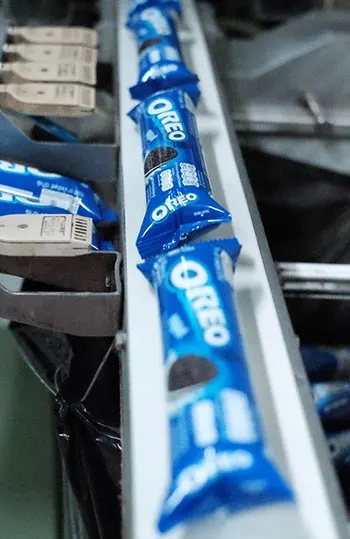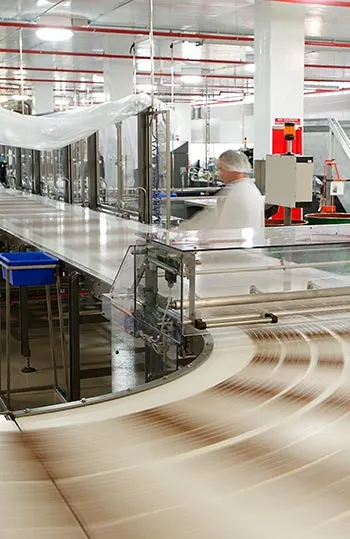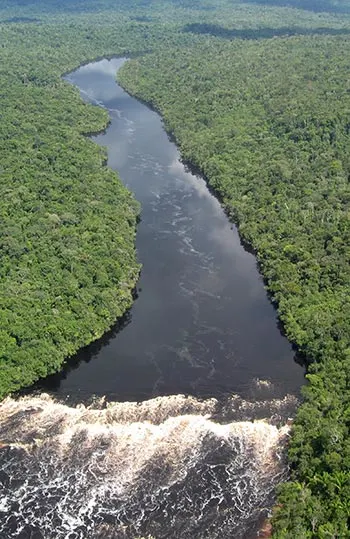ENVIRONMENTAL IMPACT
Understanding and improving our impact on the environment is important for the long- term growth and success of our business and for all our stakeholders. To make snacking more sustainable, we strive to understand risks and their potential impact, focus on opportunities to lead where we matter most, and drive change where the world needs it most. We set goals in these areas – and add new ones over time – to enhance our ambition, impact and delivery at scale.
OUR AIM* | 2024 Performance |
|---|---|
35% end-to-end CO2e emissions reduction by 2030 (vs. 2018) | (12)% |
10% CO2e emissions reductions across our manufacturing operations by 2025 (vs. 2018) | (37)% |
10% absolute water usage reduction in priority sites by 2025 (vs. 2018) | (15)% |
15% food waste reduction in internal manufacturing sites by 2025 (vs. 2018) | (30)% |
50% food waste reduction from distribution by 2025 (vs. 2018) | (47)% |
*We aim to regularly and transparently report our progress. You can find additional details on our goals within the About This Report section of our 2024 Snacking Made Right ESG Report.
Reducing Our Environmental Footprint
Smart and sustainable use of raw materials in our own operations is an important contribution to making a positive impact for our planet and people. Our sustainability aims are an ambitious end-to-end approach to reduce our environmental footprint.

Carbon Footprint
We’ve been applying the principles of the Greenhouse Gas (GHG) Protocol to our business for more than a decade. Drawing on the input of functions throughout the business – including Manufacturing and Logistics, Finance and Procurement – and working with external partners and our suppliers toward a framework for more consistent carbon reporting across our Scope 1, 2 and 3 emissions.

Member of Consumer Goods Forum Forest Positive Coalition of Action
In addition to our strategy and efforts outlined in our Deforestation Position, we are also members of the Coalition of Action. Together with partner member companies, we are collectively committed to moving efficiently and quickly towards a forest positive future. We remain fully supportive of the need to work in collaboration with multiple stakeholder with activity focused on systemic change underpinned by two pillars of the Coalition’s theory of change – supply chain management and integrated land use approach and are committed to the Coalition’s approach to working with governments, partners at the Tropical Forest Alliance and other stakeholders towards shared action and progress on supply chain sustainability and green economic development.
As a member company we will participate in and support:
- Accelerated efforts to remove commodity-driven deforestation from our individual supply chains
- Setting higher expectations for traders to act across their entire supply base
- Driving more transformational change in these key commodity landscapes
- Transparently reporting on progress to ensure accountability
Learn more at www.theconsumergoodsforum.com.

Cutting Waste
Our belief is simple: it’s better to not generate waste to begin with. As most of our factories have already achieved zero waste to landfill, we’re focusing our efforts beyond recycling waste to reducing total waste in our manufacturing. Most of our manufacturing waste is food waste and, as part of the Consumer Goods Forum’s resolution to reduce food waste within our own operations, we are continuously working to identify opportunities and course correct our practices.

Many of the water systems that support ecosystems, communities, agriculture, and industry have become stressed and are drying up or becoming too polluted to use, with the situation being exacerbated by climate change. Given the importance of these issues, Mondelēz International is aligned with the UN’s Sustainable development goals, in particular concerning the availability and sustainable management of water and sanitation for all.
From growing and sourcing the raw materials that we rely on, to operating our facilities, our business depends on water to help ensure the safety and resilience of our people and products, the security of our supplies, and the well-being of our consumers. Because water resources are shared among all users of a watershed, we recognize the need to build trust with other stakeholders and engaging in collective action within our priority watersheds.
Water stewardship is the lens we apply to develop our water strategy while we continue our effort to reduce our environmental impacts and to source our agricultural ingredients more sustainably. We are implementing the following approach to drive both site- and catchment-based actions:
- Continue delivering against our 2025 goal for water withdrawal reduction at priority manufacturing sites, in water-stressed locations.
In parallel, focus on:
- Identification of at-risk watersheds informed by our global water risk assessment and business priorities for our operations and supply chain.
- Development of detailed roadmaps and action plans for key basins by 2026, including local stakeholder consultation, to identify and respond to local water risks in at-risk watersheds.
- Deliver water stewardship outcomes thereafter, in line with our water stewardship strategy.
To mitigate and adapt to future water risk and support the conservation of freshwater ecosystems Mondelēz International intends to focus its strategy on the following areas:
- Continue working to prevent, minimize, and control pollution, while meeting or exceeding the requirements of all applicable environmental laws and regulations.
- Respond to emerging water risks by updating our Health, Safety and Environment Standard for Water Supply Management with best practices from e.g. the Alliance for Water Stewardship’s Standard for facilities in at-risk watersheds.
- Provide a safe and healthy work environment, including safe water for drinking and hygiene in our facilities, while promoting the access to water in the communities where we operate.
We will continue to integrate water stewardship roles, responsibilities and accountability into our internal governance structures tasked with supporting and driving public commitments, to enhance board oversight on water, a culture of accountability and compliance, and proactive two-way dialogues with stakeholders. Future water risk and impact considerations will continue to be considered as part in strategic business decision-making.